Blank Productions 2024
Written and directed by Mark C. Hewitt
with music by Thomas Strønen
Technical design: Paul Phillips
Video sequences: Matt Parsons
Movement consultant: Miriam King
Cast: Marta Carvalho, Leann O'Kasi, Melissa Sirol, Maria Ziołkowska.
An experimental theatre work that takes for its architectural structure the four Geneva Conventions: Wounded & Sick / Maritime / Prisoners of War / Civilians.
See the 2024 video trailer »
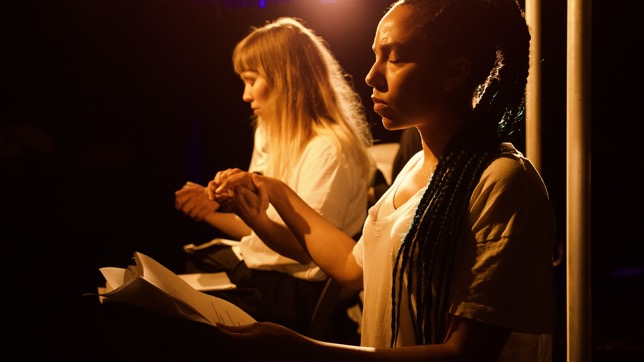
Photo by Teresa Martins, Lantern Theatre, Brighton
Music for the production was composed by Norwegian percussionist Thomas Strønen and recorded in Oslo by his ensemble Time Is A Blind Guide. The music was commissioned with support from Arts Council Norway and the Norwegian Composers Fund. The different phases of the research (in Geneva and elsewhere), and the writing and development of the stage play were supported by Arts Council England.
The work received its full premiere at Brighton Fringe Festival, May 2024, where it was selected as part of the Brighton Fringe 'Made in Sussex' showcase, with further follow-up performances in June 2024.
“… a timely and urgent reminder of the power of theatre to discomfit. … Four women actors combine in Greek chorus, join hands, peel off, turn on each other … What’s wrought is spare, original, strange; at its deepest inconsolable. There’s a desire to unsettle and appal, a refusal to accommodate sensationalism. As this gets quieter, it shouts more loudly.”
(Simon Jenner, Fringe Review)
"A highly recommended watch! … the four performers echoing each other – completing each other’s sentences – storytelling …”
(Lucy Basaba, Theatre Fullstop)


Photos by Peter Williams, 2024, Lantern Theatre, Brighton

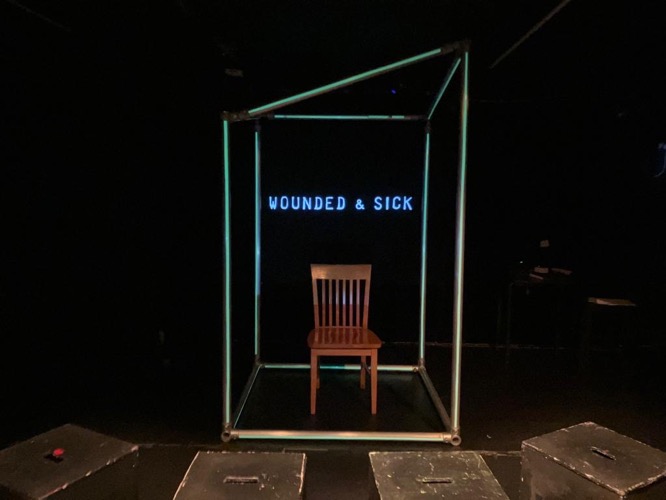
Set photos by Paul Phillips, 2024.
AUDIENCE FEEDBACK
"Powerful & moving - a hidden gem of the Fringe! An incredible troupe of international performers.”
“Absolutely loved the show. I am spellbound.”
“A wonderful theatrical experience. Moving, painful, informative and also with humour. Amazing rhythms with the words and great thought-provoking performances.”
"Great acting and powerful staging. One of my highlights of the Fringe.”
“Beautifully choregraphed movement. ."
"Loved the stylised storytelling.”
“Great balance and textures, different languages. Music all so strong and melding so well together.”
“An amazing piece of theatre – theatre as it should be. Totally engaging and beautifully performed.”
"Four amazing actors. The techniques and the performances were fantastic.”
“Intense, deep and powerful. Strong images ..."
R&D phase, 2021-2023
The work was researched by writer Mark C. Hewitt at the archives of the International Committee of the Red Cross in Geneva during 2021.
Artistic R&D took place at the Lantern Theatre in Brighton in January 2023.
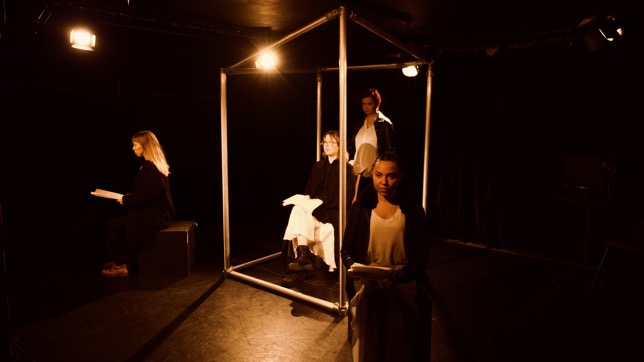
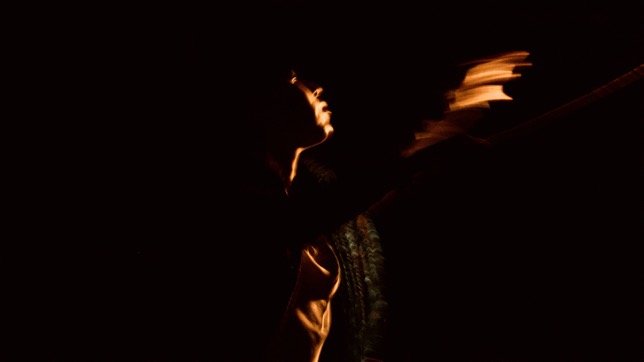
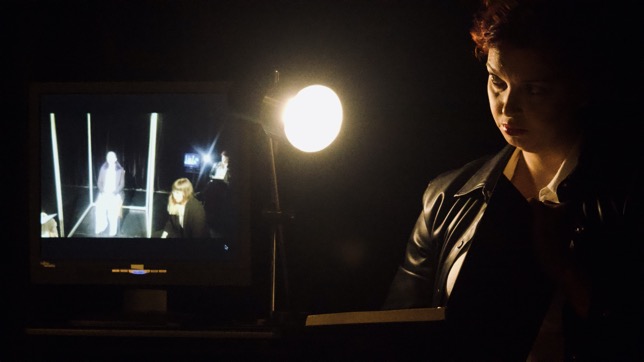
R&D photos by Teresa Martins, 2023
Audience Feedback from work in progress rehearsed reading
• "An exceptional and ambitious sharing, which made me forget I was in a rehearsed reading. Felt in good hands even before the start due to a set which made a promise that the performance delivered. Terrific layering of voices interweaving the formal text of the Convention with verbatim as well as overlaying different languages. This made for a sense of urgency and unease as well as moments of comedy that felt effortless. Wonderfully confident performances were supported by the music and the holding of silence and stillness. Wonderful 'trick' turned using the set for the video section, which was hugely effective."
• “BRILLIANT. Thought-provoking, raw, provocative, multi-dimensional; use of music, space, silence … the brave lack of ‘closure’ or conventional narrative."
• "This had a dreamlike quality and, in some ways, I feel it will have most effect tonight when I sleep. I wondered if the key word is ‘convention’, which linked the desire to create outside theatrical ‘convention’ – no plot, no characters - and the subject matter, the Geneva ‘Convention’. Feel very privileged to have witnessed these first tender explorations"
• "Loved the performance, the set and how it changed, likewise the music and the thought-provoking ideas expressed.”
• "A really powerful provocative piece.”
• "Very intense; the four different voices from different spaces in the room gave a sharp touch. Getting to know it was random (at the end, in the Q&A) was a great surprise.”
• "Really captivating experimental play. Liked the topic and the random aspect, which should be made more prominent. Bring it to the Fringe. Thanks again."
• "I liked the element of chaos and improvisation, it really added another layer to the performance …"
• "It's a really interesting piece, with a weird mix of heft and insubstantiality."
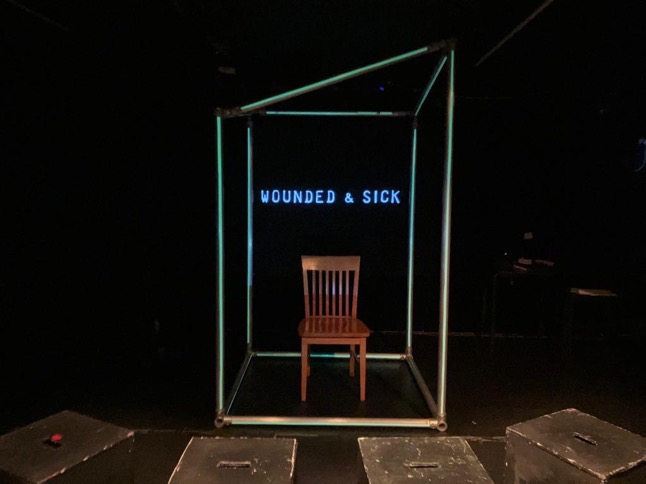
Set design by Paul Phillips.
Notes on the play and the production
Geneva Convention is a highly visual, ritualistic work, performed by an international cast. Much of the action revolves around a central cage-like structure (loosely reminiscent of the 'cages' surrounding figures in the paintings of Francis Bacon), in the centre of which is a scaled-down replica of the Broken Chair, a large sculpture by Daniel Berset that sits in the Place des Nations, opposite the United Nations HQ in Geneva, a protest against the use of armed violence on civilians. With no characters or conventional narrative plot, the production focuses instead on exploring the choral use of voices, as well as playing with elements of chance, programmed uncertainty and structured chaos.
"The impossibility of telling is not external to this story; it is this story's heart."
(Elaine Scarry, from 'War & Rape - law, memory and justice, ed. Nicola Henry)
"Because whatever has happened to humanity, whatever is currently happening to humanity, it is happening to all of us. No matter how hidden the cruelty, no matter how far off the screams and terror, we live in one world."
(Alice Walker)
"Yet again, isn't there something terrible in randomness - the idea that at the bottom of its calculations, real depravity has no master plan of any kind …":
(Anne Carsons, from the foreword to her translation of Orestes, by Eurpides)
"What we cannot speak we must consign to silence."
(Ludwig Wittgenstein)